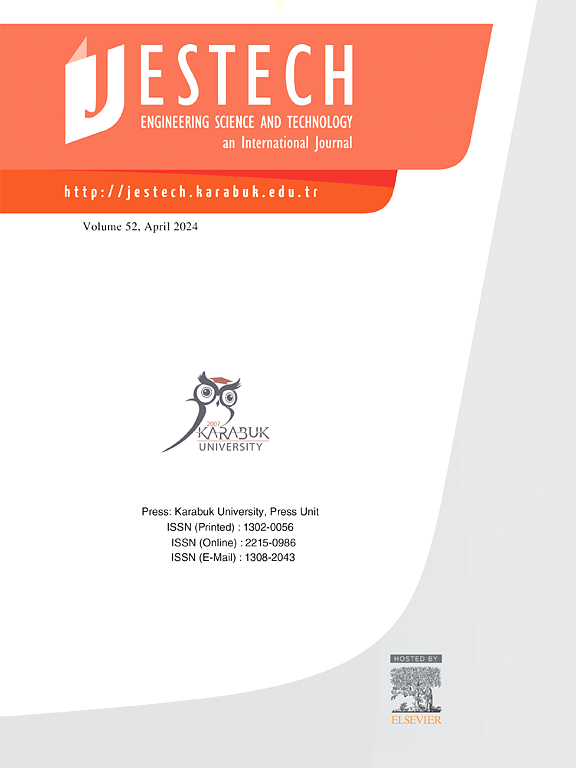Time-dependent assessment of aircraft cable current capacity for lightweight design
IF 5.1
2区 工程技术
Q1 ENGINEERING, MULTIDISCIPLINARY
Engineering Science and Technology-An International Journal-Jestech
Pub Date : 2025-07-14
DOI:10.1016/j.jestch.2025.102136
引用次数: 0
Abstract
This study proposes a time-dependent methodology for determining the current-carrying capacity of aircraft cables, addressing limitations in aviation standards such as AS50881. The aim is to enable more efficient cable selection by accounting for short-term, high-current scenarios — such as engine start-up or actuator engagement — that are typically neglected in existing standards. The proposed model incorporates environmental and operational parameters including ambient temperature, altitude, bundling conditions, and current duration. An empirical formula is developed and experimentally validated using a custom test setup replicating realistic aerospace conditions. Comparative analysis with other approaches demonstrates that the proposed method allows for accurate current rating while enabling significant reductions in cable size and weight. Experimental results indicate that current capacity predictions by AS50881 are conservative by approximately 12%, confirming opportunities for optimization. A case study on a two-pilot aircraft shows that adopting the proposed approach could reduce wiring weight by up to 20%, without compromising safety. This research provides a practical framework for incorporating time-dependent behavior into cable sizing, offering substantial benefits in terms of efficiency, sustainability, and compliance in modern aircraft wiring systems.
轻量化设计中飞机电缆电流容量的时变评估
本研究提出了一种与时间相关的方法来确定飞机电缆的载流能力,解决了AS50881等航空标准的限制。其目的是通过考虑短期、大电流情况(如发动机启动或执行器啮合),实现更高效的电缆选择,这些情况在现有标准中通常被忽略。所建议的模型包含环境和操作参数,包括环境温度、海拔、捆扎条件和当前持续时间。开发了一个经验公式,并使用一个复制实际航空航天条件的定制测试装置进行了实验验证。与其他方法的比较分析表明,所提出的方法允许精确的电流额定值,同时能够显着减小电缆的尺寸和重量。实验结果表明,AS50881目前的容量预测保守约12%,证实了优化的机会。对一架双人驾驶飞机的案例研究表明,采用该方法可以在不影响安全性的情况下减少多达20%的布线重量。本研究提供了一个实用的框架,将时间依赖行为纳入电缆尺寸,在现代飞机布线系统的效率、可持续性和合规性方面提供了实质性的好处。
本文章由计算机程序翻译,如有差异,请以英文原文为准。
求助全文
约1分钟内获得全文
求助全文
来源期刊

Engineering Science and Technology-An International Journal-Jestech
Materials Science-Electronic, Optical and Magnetic Materials
CiteScore
11.20
自引率
3.50%
发文量
153
审稿时长
22 days
期刊介绍:
Engineering Science and Technology, an International Journal (JESTECH) (formerly Technology), a peer-reviewed quarterly engineering journal, publishes both theoretical and experimental high quality papers of permanent interest, not previously published in journals, in the field of engineering and applied science which aims to promote the theory and practice of technology and engineering. In addition to peer-reviewed original research papers, the Editorial Board welcomes original research reports, state-of-the-art reviews and communications in the broadly defined field of engineering science and technology.
The scope of JESTECH includes a wide spectrum of subjects including:
-Electrical/Electronics and Computer Engineering (Biomedical Engineering and Instrumentation; Coding, Cryptography, and Information Protection; Communications, Networks, Mobile Computing and Distributed Systems; Compilers and Operating Systems; Computer Architecture, Parallel Processing, and Dependability; Computer Vision and Robotics; Control Theory; Electromagnetic Waves, Microwave Techniques and Antennas; Embedded Systems; Integrated Circuits, VLSI Design, Testing, and CAD; Microelectromechanical Systems; Microelectronics, and Electronic Devices and Circuits; Power, Energy and Energy Conversion Systems; Signal, Image, and Speech Processing)
-Mechanical and Civil Engineering (Automotive Technologies; Biomechanics; Construction Materials; Design and Manufacturing; Dynamics and Control; Energy Generation, Utilization, Conversion, and Storage; Fluid Mechanics and Hydraulics; Heat and Mass Transfer; Micro-Nano Sciences; Renewable and Sustainable Energy Technologies; Robotics and Mechatronics; Solid Mechanics and Structure; Thermal Sciences)
-Metallurgical and Materials Engineering (Advanced Materials Science; Biomaterials; Ceramic and Inorgnanic Materials; Electronic-Magnetic Materials; Energy and Environment; Materials Characterizastion; Metallurgy; Polymers and Nanocomposites)
 求助内容:
求助内容: 应助结果提醒方式:
应助结果提醒方式:


